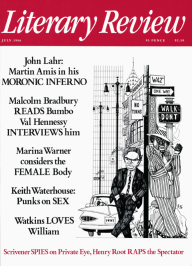John Lanchester
Humanists versus Theorists
Signifying Nothing: Truth's True Contents in Shakespeare's Text
By Malcolm Evans
Harvester Press 291pp £28.50
Shakespeare and the Question of Theory
By Patricia Parker & Geoffrey Hartman (edd.)
Methuen 335pp £20
In English culture, Shakespeare has become an impossibly bland and reassuring figure – a kind of continuation of the Queen Mother by other means. This makes it easy to forget how strange Shakespeare is. 'Gild the faces of the grooms withal,' says Lady Macbeth to her husband, 'for it must seem their guilt' – you can get so used to puns like that that they lose their shocking oddness. Certainly that pun shocked Dr Johnson: 'Could Shakespeare possibly mean to play on the similitude of gild and guilt?' he asked, horrified. Johnson's Shakespeare criticism remains essential because of his ability to be affronted, annoyed, upset by Shakespeare; his well-known inability to re-read King Lear is just the most famous instance of a continually heightened sensitivity. This strangeness of Shakespeare needs always to be rediscovered, by readers and by the theatre. Those productions which present King Lear as a senile brewery magnate, or perform Twelfth Night in full samurai regalia – that's what they're trying to do.
The recent tiny avalanche of theoretical work on the Bard (comprising Political Shakespeare, Alternative Shakespeares, Terry Eagleton's book, and the two volumes here under review) is an attempt to take up this work of renovation and reclamation. Shakespeare and the Question of Theory is a collection of essays by feminists,

Sign Up to our newsletter
Receive free articles, highlights from the archive, news, details of prizes, and much more.@Lit_Review
Follow Literary Review on Twitter
Twitter Feed
Although a pioneering physicist and mathematician, Blaise Pascal made it his mission to identify the divine presence in everyday life.
Costica Bradatan explores what such a figure has in common with later thinkers like Kierkegaard.
Costica Bradatan - Descartes Be Damned
Costica Bradatan: Descartes Be Damned - Blaise Pascal: The Man Who Made the Modern World by Graham Tomlin
literaryreview.co.uk
The era of dollar dominance might be coming to an end. But if not the dollar, which currency will be the backbone of the global economic system?
@HowardJDavies weighs up the alternatives.
Howard Davies - Greenbacks Down, First Editions Up
Howard Davies: Greenbacks Down, First Editions Up - Our Dollar, Your Problem: An Insider’s View of Seven Turbulent...
literaryreview.co.uk
Johannes Gutenberg cut corners at every turn when putting together his bible. How, then, did his creation achieve such renown?
@JosephHone_ investigates.
Joseph Hone - Start the Presses!
Joseph Hone: Start the Presses! - Johannes Gutenberg: A Biography in Books by Eric Marshall White
literaryreview.co.uk